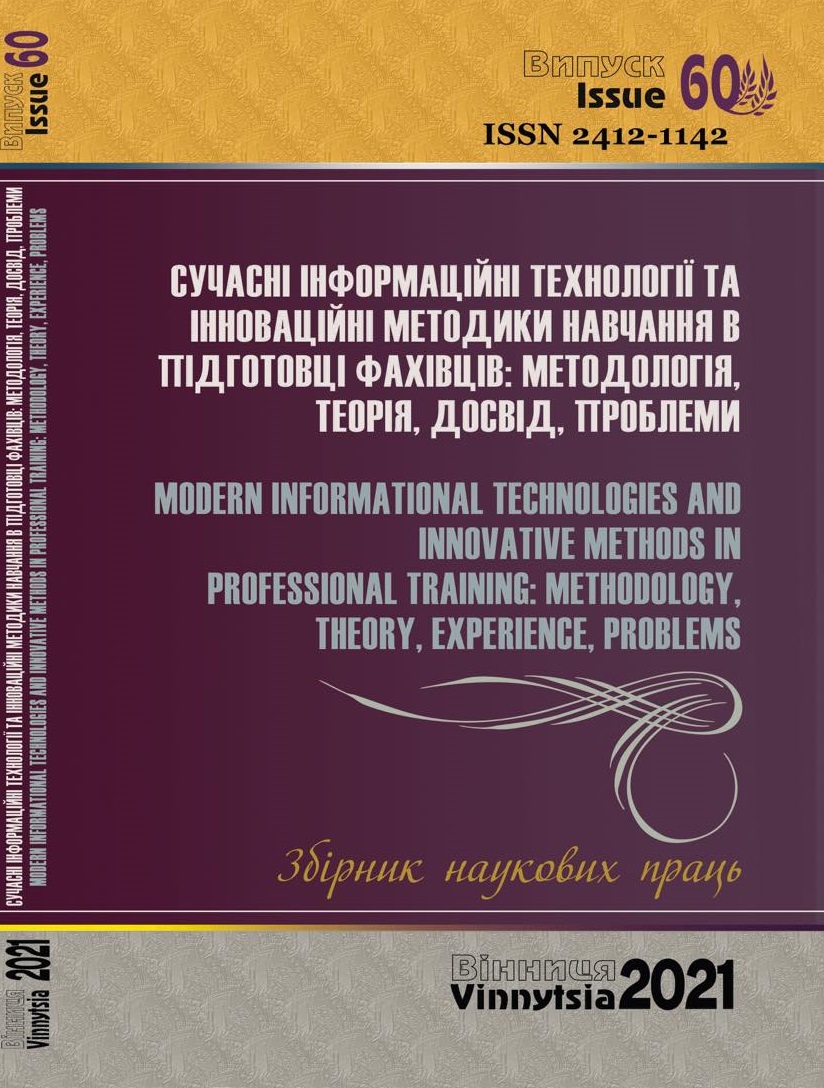STUDENT-CENTRIC APPROACH IN ENSURING THE ACQUISITION OF GENERAL (KEY) COMPETENCES BY FUTURE PROFESSIONAL EDUCATION TEACHERS
DOI:
https://doi.org/10.31652/2412-1142-2021-60-192-199Keywords:
general competencies; social skills; soft skills; emotional intelligence; vocational training, teacher of vocational educationAbstract
The pandemic emphasizes the role of the humanitarian factor in education, bringing it to the
forefront of scientific and technical knowledge. The requirements for providing students with safety and
health conditions are presented to the teaching staff in all seriousness. Along with professional training, the
task of higher education is to prepare a young person for life in the profession, for difficulties and constant
changes, to communicate with others in various social roles. The training of a specialist in higher pedagogical education falls on the period of formation of a young
person's personality full of searching for yourself in society. Vocational training programs provide for the
formation of personal qualities that facilitate the process of socialization and success - general
competencies. But in the educational process, such work requires the greatest skill and training of the
teacher. The article considers the problems of formation of general competencies in the process of
professional training of teachers and ways to solve them from the standpoint of modern understanding of
education. The proposed system of work aimed at the formation of general competencies is based on a
student-centered approach. The specifics of the stages of work on the formation of general competencies in
the educational environment of the university are considered: diagnostic; educational; developmental. The
vision of the content of these stages and their specifics are presented.
Downloads
References
Базалук О. О., Юхименко Н. Ф. «Філософія освіти»: Навчальний посібник. Київ : Кондор, 2010. 164 с.
The Future of Jobs Report 2020. URL : https://www.weforum.org/reports/the-future-of-jobs-report-2020.
Радкевич В. Розвиток професійної та фахової передвищої освіти в умовах транформаційних процесів.
Науково-методичне забезпечення професійної освіти і навчання: збірник матеріалів XIV звітної
Всеукраїнської науково-практичної конференції (м. Київ, 7 травня 2020 р.) / Інститут професійно-технічної
освіти НАПН України / за заг. ред. В. О. Радкевич. Київ : ІПТО НАПН України, 2020. 434 с.
Стандарт вищої освіти України перший (бакалаврський) рівень, галузь знань 01 – «Освіта / Педагогіка»,
спеціальність 015 – «Професійна освіта (за спеціалізаціями)».
Длугунович Н. А. Soft skills як необхідна складова підготовки ІТ-фахівців. URL :
http://journals.khnu.km.ua/vestnik/pdf/tech/2014_6/47.pdf.
Goleman D. An EI-Based Theory of Performance. From the book The Emotionally Intelligent Workplace. Edited
by: Cary Cherniss and Daniel Goleman. URL : https://www.strategies-for-managing-change.com/support-
files/danielgolemanemotionalintelligencenotes.pdf
Кремінь В. Г., Ільїн В. В. Філософія: мислителі, ідеї, концепції. Київ, 2005. 528 с.
Воборцова Л. С. Глобалізація як соціальне явище сучасності. Наука. Релігія. Суспільство. 2006. No 2.
С. 199–204.
Дворкін Р. Ліберальна концепція рівності. Лібералізм. Ліберальна традиція політичного мислення від
Джона Локка до Джона Роулза. Антологія. Київ : Смолоскип, 2009. С. 825–847.
Горбатюк Р. Система професійної підготовки майбутніх інженерів-педагогів комп’ютерного профілю :
Монографія. Тернопіль : Підручники і посібники, 2009. 400 с.
Wong, C.S, Wong, P.M., & Law, K. S. (2007). Evidence on the practical utility of Wong's emotional intelligence
scale in Hong Kong and Mainland China. Asia Pacific Journal of Management, 24, 43–60.
Гуревич Р. С., Габрійчук Л. Е., Герасименко Н. В. Професійна освіта в ХХІ столітті: проблеми і
перспективи. Наукові записки Вінницького державного педагогічного університету імені Михайла
Коцюбинського. Серія : Педагогіка і психологія. 2020. No 63. С. 103–108. URL :
http://nbuv.gov.ua/UJRN/Nzvdpu_pp_2020_63_18.
SEL: What Are the Core Competence Areas and Where are they Promoted? URL : https://casel.org/what-is-sel/
Reuven Bar-On The Bar-On Model of Emotional-Social Intelligence. URL :
https://www.researchgate.net/publication/6509274_The_Bar-On_Model_of_Emotional-Social_Intelligence.
Мідляр А. К., Махначова Н. М. Підвищення емоційного інтелекту керівника підприємства. URL :
http://www.global-national.in.ua/issue-13-2016.
Детальний тест на емоційний інтелект. URL : https://www.idrlabs.com/ua/global-eq/test.php.
Колісник Л. О. Проблема діагностики емоційного інтелекту. Проблеми сучасної психології. Вип. 26.
Камянець-Подільський : Аксіома, 2014. С. 278–295. URL : https://essuir.sumdu.edu.ua/bitstream-
download/123456789/46747/3/Kolisnyk_Problema_diagnostiki_emoziynogo_intelektu.pdf;jsessionid=98CA3F8
A3A42A2C41FEE4146E9055C0B.
Черниш О. Емоційний інтелект та його особливості. Вебінар. URL : https://vseosvita.ua/webinar/emocijnij-
intelekt-ta-jogo-osoblivosti-25.html.
Downloads
Published
Issue
Section
License
Copyright (c) 2021 Роман Горбатюк, Світлана Кучер

This work is licensed under a Creative Commons Attribution 4.0 International License.

